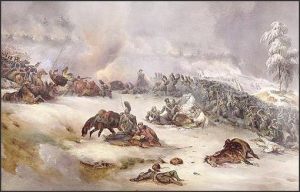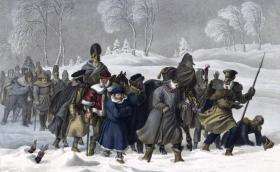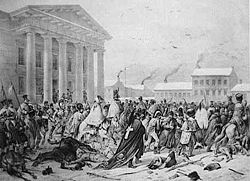When Napoleon left the army to return to Paris, he left Marshal Murat, King of Naples, in charge. Captain Coignet of the Imperial Guard Grenadiers writes in his memoirs, “But it was a Wilna that we suffered most. The weather was so severe that the men could no longer endure it; even the ravens froze.”
“We remained under the command of the King of Naples, and were not too happy in our minds, for, though he was always the first to draw a sabre or brave danger, he may truly be said to have been the executioner of our cavalry. He kept his divisions constantly mounted all along the route, and they were more than enough to keep the Cossacks at bay; but our cavalry were dying of starvation, and when night came, the unfortunate soldiers were not able to use their horses to go for forage… He was, indeed the handsomest horseman in Europe; but without foresight, for it was not a question of being an intrepid soldier, but of being able to economize his resources. He lost us (I heard this said to Marshal Davout) forty thousand horses through his mismanagement. It is always wrong to blame one’s officers; but the Emperor could have made a better selection. There were among our leaders two warriors, rivals in glory, Marshal Ney and Prince Beauharnais, who saved us from the greatest perils by their coolness and courage.”
“The King of Naples went on to Wilna; he arrived there on the 8th of December, and we with the guard, on the 10th. It was night when we came to the gates of the city, which were barricaded with pieces of wood. We had the greatest difficulty in entering. I and my comrade were lodged in a school, well warmed.”
“When I went to my general of orders, he said, ‘Be ready at four in the morning to leave the city, for the enemy is now arriving on the heights, and we shall be bombarded at daylight. Do not lose any time.'”
“We had scarcely got ready to leave when the Russians forced the Witepsk gate; we had barely time to get out… When we reached the mountain of Wilna the confusion was at its height. All the material of the army and the Emperor’s carriages were on the ground. The soldiers helped themselves to gold and silver plate. All the chests and casks were burst open. What a quantity of plunder was left on that spot! No, a thousand times no; never was there such a sight!”
—
Louis Victor Léon Rochechouart, the French emigré officer serving on [Pavel] Chichagov’s [Russian] staff, describes the scene upon entering Vilna:
 “On 11 December, when the cold reached -29º Réaumur [-36º Celsius], I entered Vilna, crouching at the bottom of the carriage. We traveled forward amid human remains, frozen on the road, and hundreds of horses that had died of hunger and cold, or had broken their legs, for they were not roughshod; our servants walked in front thrusting the obstacles in the way to the right or left. It is impossible to imagine the state of Vilna during the four days after our arrival; we found sick or wounded prisoners—Frenchmen, Poles, Germans, Spaniards, Italians and Portuguese, crowded into the various convents and monasteries. It was necessary to house everybody. Happily, the French government had accumulated immense stores of provisions, which they had not been able to use, being so closely pursued by the Russians. They were distributed among all. The frozen snow which covered the streets deadened the sound of the vehicles that were constantly passing, but did not prevent hearing the cries of the wounded asking for food, or the drivers urging their horses on.“
“On 11 December, when the cold reached -29º Réaumur [-36º Celsius], I entered Vilna, crouching at the bottom of the carriage. We traveled forward amid human remains, frozen on the road, and hundreds of horses that had died of hunger and cold, or had broken their legs, for they were not roughshod; our servants walked in front thrusting the obstacles in the way to the right or left. It is impossible to imagine the state of Vilna during the four days after our arrival; we found sick or wounded prisoners—Frenchmen, Poles, Germans, Spaniards, Italians and Portuguese, crowded into the various convents and monasteries. It was necessary to house everybody. Happily, the French government had accumulated immense stores of provisions, which they had not been able to use, being so closely pursued by the Russians. They were distributed among all. The frozen snow which covered the streets deadened the sound of the vehicles that were constantly passing, but did not prevent hearing the cries of the wounded asking for food, or the drivers urging their horses on.“
Mikaberidze, A (2012) Russian Eyewitness Accounts of the Campaign of 1812. Frontline Books (an imprint of Pen & Sword Books Ltd), Barnsley, South Yorkshire, UK. p. 251.
—
Faber du Faur’s depiction of the 11th of December has the following description:
Near Eve, 11 December
“We left Vilna on the 10th and abandoned thousands of dead, dying and prisoners. We managed to avoid the chaos at Ponari, which cost the army most of the rest of its artillery and transport – and even the Imperial Treasury – and made our weary way towards Kovno, protected by a weak rearguard but sill suffering from the relentless cold. A vast number of men died on this final forced march.”
“We finally reached Eve, a small town familiar to us from having passed through it that very summer. How things had changed! Eve was stripped of the charms of summer, abandoned and partially buried under the deep snow. And the town, which in the summer had seen a brilliant army march through, was now obliged to see its ghostly streets play host to groups of miserable individuals, ruined by the Russian climate and by hunger and hoping for nothing more than to reach the banks of the Niemen at Kovno.”
Sources:
Captain Coignet: A Soldier of Napoleon’s Imperial Guard from the Italian Campaign to Waterloo, Jean-Roch Coignet, pp 233 – 234
Russian Eyewitness Accounts of the Campaign of 1812, Alexander Mikaberidze, p 251
With Napoleon in Russia: The Illustrated Memoirs of Major Faber du Faur, 1812, edited by Jonathan North
Thank you to James Fisher for providing the quote from Alexander Mikaberidze’s book of Russian eyewitness accounts.









